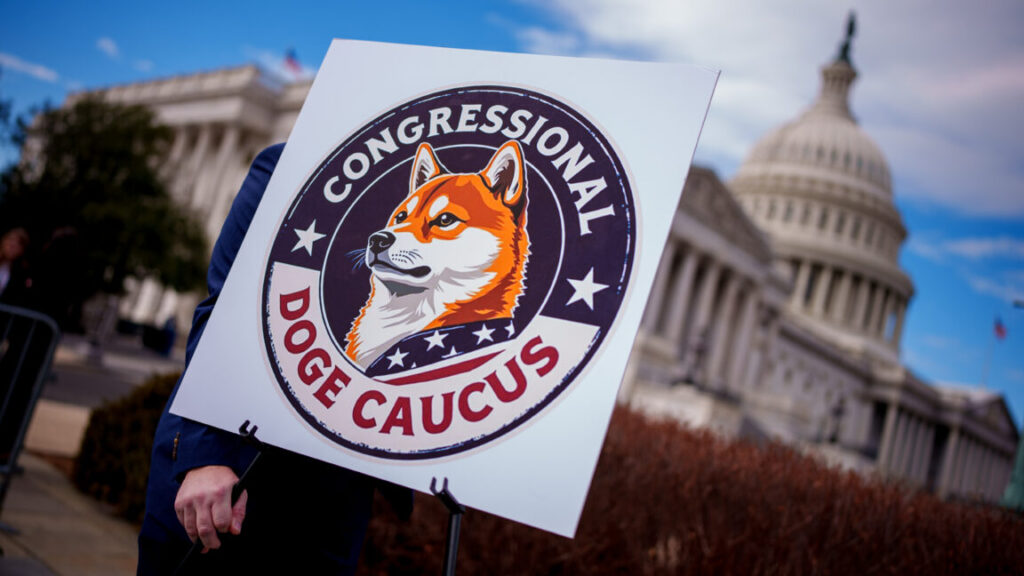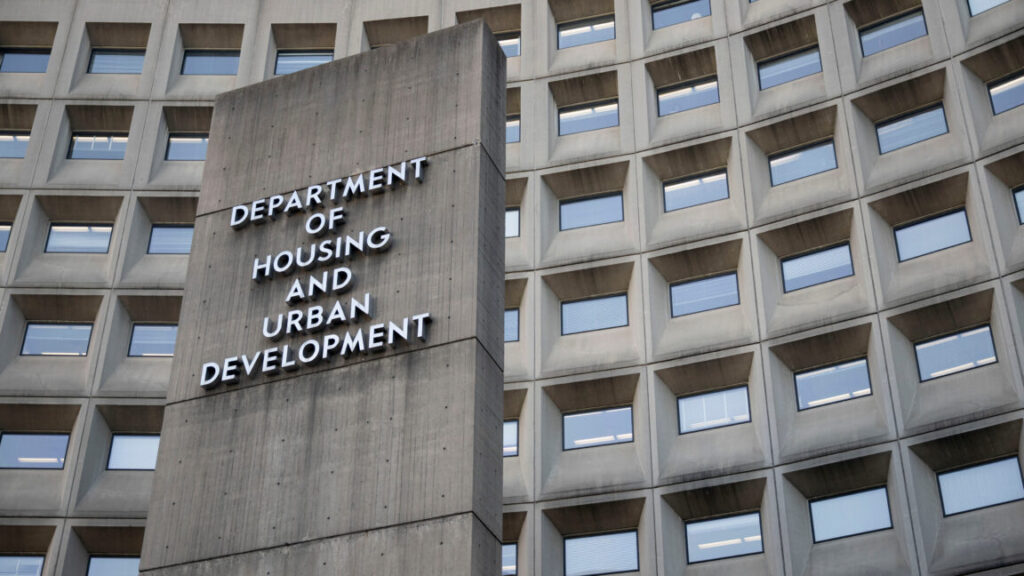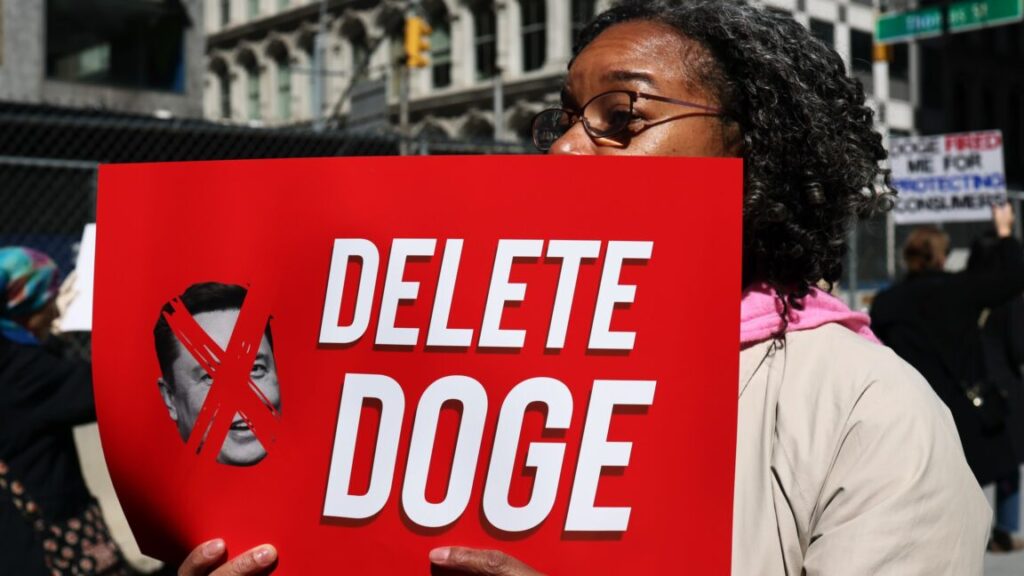A DOGE recruiter is staffing a project to deploy AI agents across the US government
“does it still require Kremlin oversight?
A startup founder said that AI agents could do the work of tens of thousands of government employees.
An aide sets up a poster depicting the logo for the DOGE Caucus before a news conference in Washington, DC. Credit: Andrew Harnik/Getty Images
A young entrepreneur who was among the earliest known recruiters for Elon Musk’s so-called Department of Government Efficiency (DOGE) has a new, related gig—and he’s hiring. Anthony Jancso, cofounder of AcclerateX, a government tech startup, is looking for technologists to work on a project that aims to have artificial intelligence perform tasks that are currently the responsibility of tens of thousands of federal workers.
Jancso, a former Palantir employee, wrote in a Slack with about 2000 Palantir alumni in it that he’s hiring for a “DOGE orthogonal project to design benchmarks and deploy AI agents across live workflows in federal agencies,” according to an April 21 post reviewed by WIRED. Agents are programs that can perform work autonomously.
We’ve identified over 300 roles with almost full-process standardization, freeing up at least 70k FTEs for higher-impact work over the next year,” he continued, essentially claiming that tens of thousands of federal employees could see many aspects of their job automated and replaced by these AI agents. Workers for the project, he wrote, would be based on site in Washington, DC, and would not require a security clearance; it isn’t clear for whom they would work. Palantir did not respond to requests for comment.
The post was not well received. Eight people reacted with clown face emojis, three reacted with a custom emoji of a man licking a boot, two reacted with custom emoji of Joaquin Phoenix giving a thumbs down in the movie Gladiator, and three reacted with a custom emoji with the word “Fascist.” Three responded with a heart emoji.
“DOGE does not seem interested in finding ‘higher impact work’ for federal employees,” one person said in a comment that received 11 heart reactions. “You’re complicit in firing 70k federal employees and replacing them with shitty autocorrect.”
“Tbf we’re all going to be replaced with shitty autocorrect (written by chatgpt),” another person commented, which received one “+1” reaction.
“How ‘DOGE orthogonal’ is it? Like, does it still require Kremlin oversight?” another person said in a comment that received five reactions with a fire emoji. “Or do they just use your credentials to log in later?”
AccelerateX was originally called AccelerateSF, which VentureBeat reported in 2023 had received support from OpenAI and Anthropic. In its earliest incarnation, AccelerateSF hosted a hackathon for AI developers aimed at using the technology to solve San Francisco’s social problems. According to a 2023 Mission Local story, for instance, Jancso proposed that using large language models to help businesses fill out permit forms to streamline the construction paperwork process might help drive down housing prices. (OpenAI did not respond to a request for comment. Anthropic spokesperson Danielle Ghiglieri tells WIRED that the company “never invested in AccelerateX/SF,” but did sponsor a hackathon AccelerateSF hosted in 2023 by providing free access to its API usage at a time when its Claude API “was still in beta.”)
In 2024, the mission pivoted, with the venture becoming known as AccelerateX. In a post on X announcing the change, the company posted, “Outdated tech is dragging down the US Government. Legacy vendors sell broken systems at increasingly steep prices. This hurts every American citizen.” AccelerateX did not respond to a request for comment.
According to sources with direct knowledge, Jancso disclosed that AccelerateX had signed a partnership agreement with Palantir in 2024. According to the LinkedIn of someone described as one of AccelerateX’s cofounders, Rachel Yee, the company looks to have received funding from OpenAI’s Converge 2 Accelerator. Another of AccelerateSF’s cofounders, Kay Sorin, now works for OpenAI, having joined the company several months after that hackathon. Sorin and Yee did not respond to requests for comment.
Jancso’s cofounder, Jordan Wick, a former Waymo engineer, has been an active member of DOGE, appearing at several agencies over the past few months, including the Consumer Financial Protection Bureau, National Labor Relations Board, the Department of Labor, and the Department of Education. In 2023, Jancso attended a hackathon hosted by ScaleAI; WIRED found that another DOGE member, Ethan Shaotran, also attended the same hackathon.
Since its creation in the first days of the second Trump administration, DOGE has pushed the use of AI across agencies, even as it has sought to cut tens of thousands of federal jobs. At the Department of Veterans Affairs, a DOGE associate suggested using AI to write code for the agency’s website; at the General Services Administration, DOGE has rolled out the GSAi chatbot; the group has sought to automate the process of firing government employees with a tool called AutoRIF; and a DOGE operative at the Department of Housing and Urban Development is using AI tools to examine and propose changes to regulations. But experts say that deploying AI agents to do the work of 70,000 people would be tricky if not impossible.
A federal employee with knowledge of government contracting, who spoke to WIRED on the condition of anonymity because they were not authorized to speak to the press, says, “A lot of agencies have procedures that can differ widely based on their own rules and regulations, and so deploying AI agents across agencies at scale would likely be very difficult.”
Oren Etzioni, cofounder of the AI startup Vercept, says that while AI agents can be good at doing some things—like using an internet browser to conduct research—their outputs can still vary widely and be highly unreliable. For instance, customer service AI agents have invented nonexistent policies when trying to address user concerns. Even research, he says, requires a human to actually make sure what the AI is spitting out is correct.
“We want our government to be something that we can rely on, as opposed to something that is on the absolute bleeding edge,” says Etzioni. “We don’t need it to be bureaucratic and slow, but if corporations haven’t adopted this yet, is the government really where we want to be experimenting with the cutting edge AI?”
Etzioni says that AI agents are also not great 1-1 fits for job replacements. Rather, AI is able to do certain tasks or make others more efficient, but the idea that the technology could do the jobs of 70,000 employees would not be possible. “Unless you’re using funny math,” he says, “no way.”
Jancso, first identified by WIRED in February, was one of the earliest recruiters for DOGE in the months before Donald Trump was inaugurated. In December, Jancso, who sources told WIRED said he had been recruited by Steve Davis, president of the Musk-founded Boring Company and a current member of DOGE, used the Palantir alumni group to recruit DOGE members. On December 2nd, 2024, he wrote, “I’m helping Elon’s team find tech talent for the Department of Government Efficiency (DOGE) in the new admin. This is a historic opportunity to build an efficient government, and to cut the federal budget by 1/3. If you’re interested in playing a role in this mission, please reach out in the next few days.”
According to one source at SpaceX, who asked to remain anonymous as they are not authorized to speak to the press, Jancso appeared to be one of the DOGE members who worked out of the company’s DC office in the days before inauguration along with several other people who would constitute some of DOGE’s earliest members. SpaceX did not respond to a request for comment.
Palantir was cofounded by Peter Thiel, a billionaire and longtime Trump supporter with close ties to Musk. Palantir, which provides data analytics tools to several government agencies including the Department of Defense and the Department of Homeland Security, has received billions of dollars in government contracts. During the second Trump administration, the company has been involved in helping to build a “mega API” to connect data from the Internal Revenue Service to other government agencies, and is working with Immigration and Customs Enforcement to create a massive surveillance platform to identify immigrants to target for deportation.
This story originally appeared at WIRED.com.
A DOGE recruiter is staffing a project to deploy AI agents across the US government Read More »





